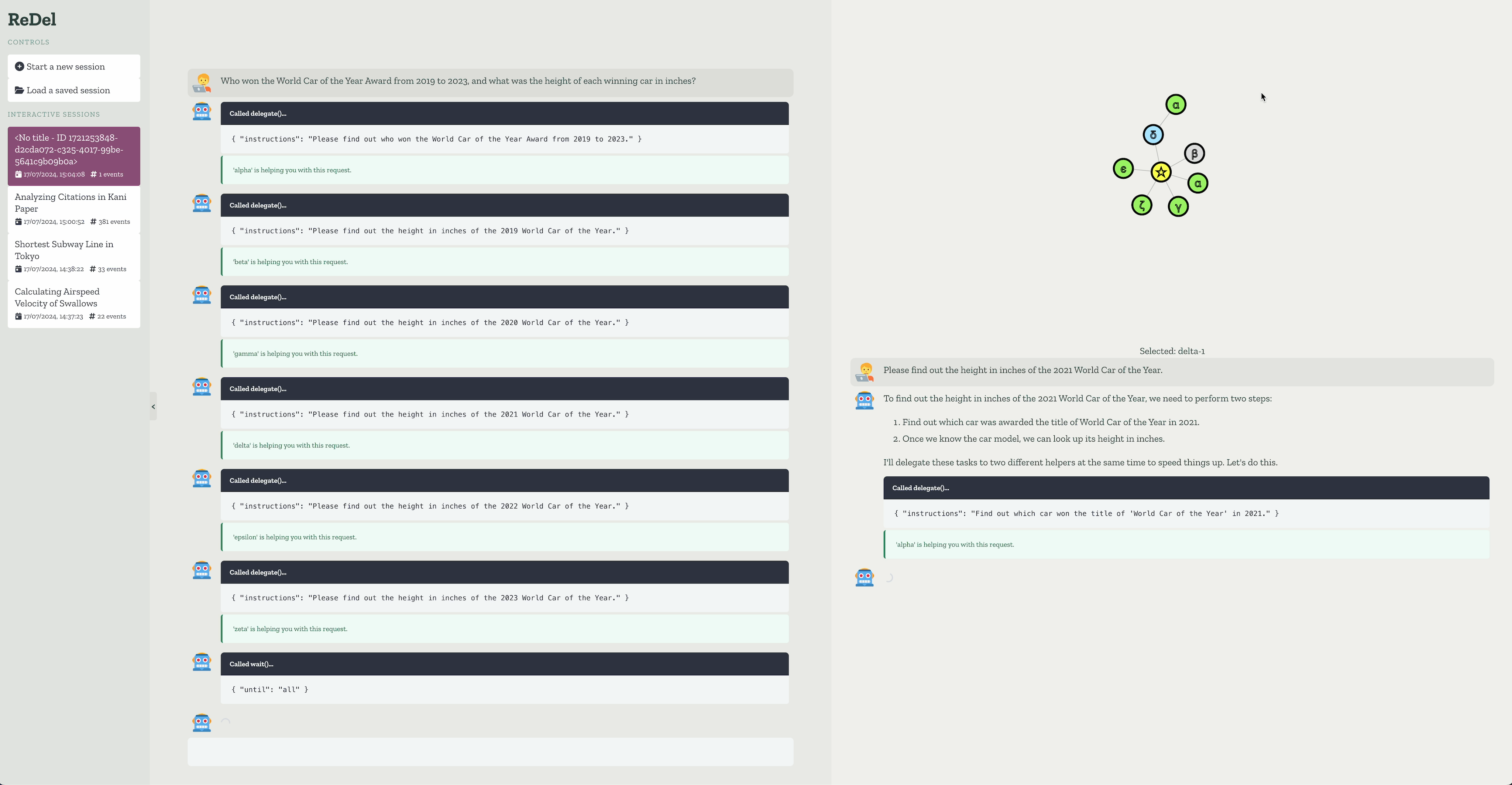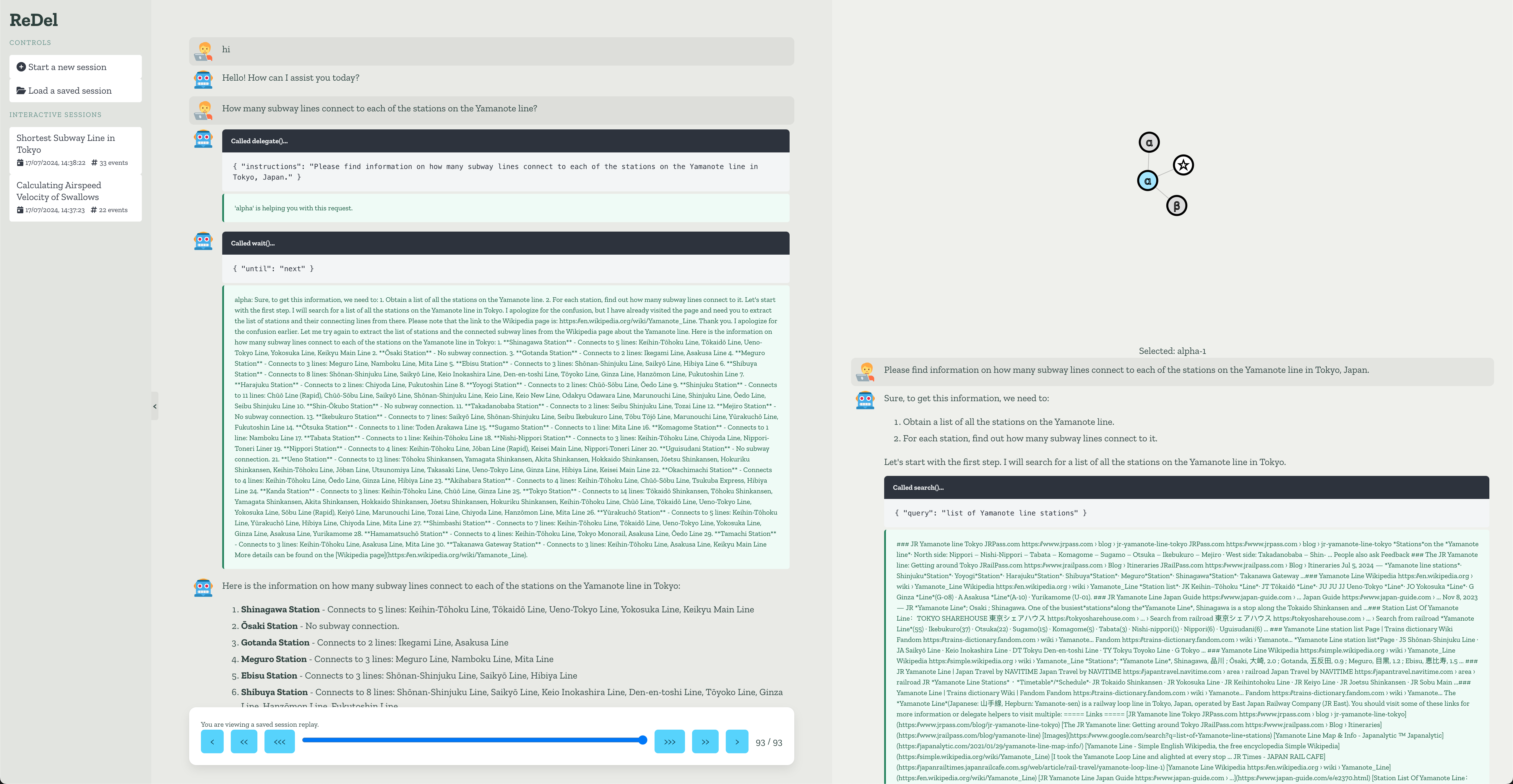A framework for recursive delegation of LLMs
ReDel is a toolkit for researchers and developers to build, iterate on, and analyze recursive multi-agent systems.
Built using the kani framework, it offers best-in-class support for modern LLMs with tool usage.
- Modular design - ReDel makes it easy to experiment by providing a modular interface for creating tools, different delegation methods, and logs for later analysis.
- Event-driven architecture - Granular logging and a central event system makes it easy to listen for signals from anywhere in your system. Every event is automatically logged so you can run your favorite data analysis tools.
- Bundled visualization - Multi-agent systems can be hard to reason about from a human perspective. We provide a web-based visualization that allows you to interact with a configured system directly or view replays of saved runs (e.g. your own experiments!).
- Built with open, unopinionated tech - ReDel won't force you to learn bizarre library-specific tooling and isn't built by a big tech organization with their own motives. Everything in ReDel is implemented in pure, idiomatic Python and permissively licensed.
Requires Python 3.10+
# install python dependencies
$ pip install "redel[all] @ git+https://github.com/zhudotexe/redel.git@main"
# run web visualization of a ReDel system with web browsing
$ OPENAI_API_KEY="..." python -m redel.serverThere are two primary ways to interact with a system: interactively, through the web interface, or programmatically. The former is particularly useful to debug your system's behaviour, iterate on prompts, or otherwise provide an interactive experience. The latter is useful for running experiments and batch queries.
See the docs for more usage information at https://redel.readthedocs.io!
from kani.engines.openai import OpenAIEngine
from redel import AUTOGENERATE_TITLE, ReDel
from redel.server import VizServer
from redel.tools.browsing import Browsing
# Define the LLM engines to use for each node
engine = OpenAIEngine(model="gpt-4", temperature=0.8, top_p=0.95)
# Define the configuration for each interactive session
redel_proto = ReDel(
root_engine=engine,
delegate_engine=engine,
title=AUTOGENERATE_TITLE,
tool_configs={
Browsing: {"always_include": True},
},
)
# configure and start the server
server = VizServer(redel_proto)
server.serve()import asyncio
from kani import ChatRole
from kani.engines.openai import OpenAIEngine
from redel import ReDel, events
from redel.tools.browsing import Browsing
# Define the LLM engines to use for each node
engine = OpenAIEngine(model="gpt-4", temperature=0.8, top_p=0.95)
# Define the configuration for the session
ai = ReDel(
root_engine=engine,
delegate_engine=engine,
title="Airspeed of a swallow",
tool_configs={
Browsing: {"always_include": True},
},
)
# ReDel is async, so define an async function and use asyncio.run()
async def main():
async for event in ai.query("What is the airspeed velocity of an unladen swallow?"):
if isinstance(event, events.RootMessage) and event.msg.role == ChatRole.ASSISTANT:
if event.msg.text:
print(event.msg.text)
asyncio.run(main())Note
This section is specific to the demo/emnlp branch of this repository. You can switch branches in the top-left of
the GitHub UI or by using this link: https://github.com/zhudotexe/redel/tree/demo/emnlp
This repository includes the logs of every single experiment run included in our paper in
the experiments/ directory. You can load any of these runs in the visualization to view what the ReDel system did!
The experiments directory is broken down into the following
structure: experiments/BENCHMARK_NAME/BENCHMARK_SPLIT/[RUN_ID]/SYSTEM_ID/QUERY_ID, where:
BENCHMARK_NAMEis the name of the benchmark (fanoutqa, travelplanner, or webarena)BENCHMARK_SPLITis the split of the benchmark we ran (usually the dev/validation split)RUN_IDis an internal split in the FanOutQA experiment to analyze an edge-case behaviour wrt parallel function calling and long contextsSYSTEM_IDis the system under test, configured as in the table belowQUERY_IDis the benchmark-specific ID of a single run (loadable in the visualizer).
| System ID | Root Model | Delegate Model | Root Functions? | Delegation? | Root Context | Delegate Context |
|---|---|---|---|---|---|---|
| full | gpt-4o | gpt-4o | no | yes | 128000 | 128000 |
| root-fc | gpt-4o | gpt-4o | yes | yes | 128000 | 128000 |
| baseline | gpt-4o | N/A | yes | no | 128000 | N/A |
| small-leaf | gpt-4o | gpt-3.5-turbo | no | yes | 128000 | 16385 |
| small-all | gpt-3.5-turbo | gpt-3.5-turbo | no | yes | 16385 | 16385 |
| small-baseline | gpt-3.5-turbo | N/A | yes | no | 16385 | N/A |
| short-context | gpt-4o | gpt-4o | no | yes | 8192 | 8192 |
| short-baseline | gpt-4o | N/A | yes | no | 8192 | N/A |
To reproduce the experiments included in this repository, we include scripts to run each benchmark.
Follow these steps to setup the environment, then follow the instructions in each benchmark. We recommend setting up a virtual environment for this project.
- First, you'll need to clone this repository and check out the
demo/emnlpbranch:git clone -b demo/emnlp https://github.com/zhudotexe/redel - Install the necessary dependencies:
pip install -r requirements.txt
output path: experiments/fanoutqa/dev/trial2/SYSTEM_ID
Run
python bench_fanoutqa.py <full|root-fc|baseline|small-leaf|small-all|small-baseline|short-context|short-baseline>This will run the given system on the FanOutQA dev set in the Open Book setting.
Evaluate
Set the FANOUTQA_OPENAI_API_KEY environment variable to a valid OpenAI API key. You can
use export FANOUTQA_OPENAI_API_KEY=$OPENAI_API_KEY to copy an existing API key from environment variables.
python score_fanoutqa.py experiments/fanoutqa/**/results.jsonlThis will output a score.json file in the output path with the final scores.
output path: experiments/travelplanner/validation/SYSTEM_ID
Setup
- Install the TravelPlanner database:
- Download the database from this link
- Extract the zip file in
redel/tools/travelplanner. This should create a directory nameddb.
- In another directory, clone our fork of the TravelPlanner repository. This will be used for scoring, and includes the
fixes discussed in our paper.
git clone https://github.com/zhudotexe/TravelPlanner
Run
python bench_travelplanner.py <full|root-fc|baseline|small-leaf|small-all|small-baseline>Note: This benchmark does not test the short-ctx systems since this benchmark doesn't have a long-context requirement.
Evaluate
python score_travelplanner.py experiments/travelplanner/**/results.jsonlThis script will write files in the correct format for the TravelPlanner evaluation in the output path, and print the command to run to score the results.
You should now switch to the TravelPlanner repository you cloned in the setup step and run the commands output by this script.
output path: experiments/webarena/test/SYSTEM_ID
Setup
We reproduce some of the scripts and data contained in the WebArena repository in this repo under the terms of the
Apache-2.0 license, contained in experiments/webarena/vendor/LICENSE.
First, you'll need to set up your own WebArena environment. See https://github.com/web-arena-x/webarena/blob/main/environment_docker/README.md for instructions.
Next, run the following to setup the webarena configuration:
# setup env vars (see https://github.com/web-arena-x/webarena/blob/main/environment_docker/README.md for env setup)
export SHOPPING="<your_shopping_site_domain>:7770"
export SHOPPING_ADMIN="<your_e_commerce_cms_domain>:7780/admin"
export REDDIT="<your_reddit_domain>:9999"
export GITLAB="<your_gitlab_domain>:8023"
export MAP="<your_map_domain>:3000"
export WIKIPEDIA="<your_wikipedia_domain>:8888/wikipedia_en_all_maxi_2022-05/A/User:The_other_Kiwix_guy/Landing"
export HOMEPAGE="<your_homepage_domain>:4399"
# generate config files
python experiments/webarena/generate_test_data.pyYou'll also need to ensure Playwright is installed:
playwright install chromiumRun
First, make sure you have reset your WebArena environment (see https://github.com/web-arena-x/webarena/blob/main/environment_docker/README.md#environment-reset).
Then, launch the WebArena environment.
As the default WebArena script is incompatible with asyncio, ReDel launches a separate process to handle the WebArena environment, which it communicates with over a pipe. This is done automatically.
Finally, run the bench script:
python bench_webarena.py <full|root-fc|baseline|small-leaf|small-all|small-baseline|short-context|short-baseline>We release ReDel under the terms of the MIT license, included in LICENSE. ReDel is intended for academic and personal
use only. To use ReDel for commercial purposes, please contact us.
If you use our code or findings in your research, please cite us as:
@inproceedings{zhu-etal-2024-redel,
title = "{R}e{D}el: A Toolkit for {LLM}-Powered Recursive Multi-Agent Systems",
author = "Zhu, Andrew and
Dugan, Liam and
Callison-Burch, Chris",
editor = "Hernandez Farias, Delia Irazu and
Hope, Tom and
Li, Manling",
booktitle = "Proceedings of the 2024 Conference on Empirical Methods in Natural Language Processing: System Demonstrations",
month = nov,
year = "2024",
address = "Miami, Florida, USA",
publisher = "Association for Computational Linguistics",
url = "https://aclanthology.org/2024.emnlp-demo.17",
pages = "162--171",
}
The core development team is made of two PhD students in the Department of Computer and Information Science at the University of Pennsylvania. We're members of Prof. Chris Callison-Burch's lab, working towards advancing the future of NLP.
- Andrew Zhu started in Fall 2022. His research interests include natural language processing, programming languages, distributed systems, and more. He's also a full-stack software engineer, proficient in all manner of backend, devops, database, and frontend engineering. Andrew strives to make idiomatic, clean, performant, and low-maintenance code — philosophies that are often rare in academia. His research is supported by the NSF Graduate Research Fellowship.
- Liam Dugan started in Fall 2021. His research focuses primarily on large language models and how humans interact with them. In particular, he is interested in human detection of generated text and whether we can apply those insights to automatic detection systems. He is also interested in the practical application of large language models to education.
Library Support: We are working on researching recursive multi-agent systems using ReDel, and we aim to keep it up-to-date with modern NLP practices. As an active research library, the release schedule is somewhat ad-hoc. Published releases should be stable for wide use, and any experiment-specific code should be contained within a branch or fork.
This research is supported in part by the Office of the Director of National Intelligence (ODNI), Intelligence Advanced Research Projects Activity (IARPA), via the HIATUS Program contract #2022-22072200005. This material is based upon work supported by the National Science Foundation Graduate Research Fellowship, under Grant No. DGE-2236662. The views and conclusions contained herein are those of the authors and should not be interpreted as necessarily representing the official policies or views, either expressed or implied, of ODNI, IARPA, the NSF, or the U.S. Government. The U.S. Government is authorized to reproduce and distribute reprints for governmental purposes notwithstanding any copyright annotation therein.




